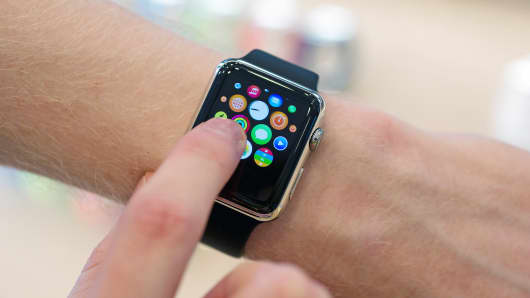This may sound far-fetched, but much of this functionality is already available today at 150 Starwood hotels that support SPG's new app. They're rolling it out to W Hotels, Aloft, and Element properties around the world. As a generation of new users adopt the Apple Watch and similar wearables, they will be met with a bevy of applications that will wow these early users and leave other certain brands in the dust.
Read More Apple Watch may disappoint investors
For users who opt-in, their watches will tell hotels an unprecedented amount of information about their preferences, habits, and needs from how many times you visited the gym to what and whether you ate at the hotel restaurants. Certain preferred guests may arrive the breakfast table to find that they have a free meal because information about who they are and where they are will be available to servers in real time. If you're attending a conference at the hotel, you may see personal message on a screen welcoming you by name and telling you that your meeting is in the Conference Room A on the 2nd floor.
Wearables will provide innovative companies with new opportunities to drive higher brand loyalty with memorable and transformative brand experiences. For millennials increasingly willing to share more private information, the convenience of brand experiences that are tailored to their context and locations are arguable more welcome than in other demographics.
Read MoreApple Watch will be big by the end of 2016: Analyst
The Apple Watch is poised to transform the travel industry and if you have any doubt about the impact of the watch on travel, here are three facts that will change your mind:
- Over 1 million people bought the Apple Watch in its first week of availability according to Slice Intelligence. Consider that Android Wear sold only 720,000 units for the entire year in 2014 according to Tech Radar.
- There are 3,500 apps already available for the Apple Watch, according to CEO Tim Cook. "To give you a comparison, when we launched the iPhone, we had about 500 apps that were ready. When we launched iPad, we had about a thousand," he said during a recent earnings call.
- Travel apps are featured prominently on Apple's own website promoting the watch, two of the first three apps listed are in the travel sector.
Read MoreAmazon's drones could follow you to work
There are also a new generation of airline apps that enable you to check in to a flight, view your trips, get directions to the airport, and view your boarding gate at a glance. While on the flight, you'll be able to see the remaining flight time and receive information about connecting gates and baggage claim.
With Apple Watch, when you're standing in that long line at TSA, you'll be able to show a boarding pass QR coding without reaching into your pocket to find your find your phone. These experiences will be driven by brands' desires to make greater strides among affluent and younger audiences including much sought after millennials.
You might ask yourself, why people would use Apple Watch to perform activities that are also available on their phones? The answer is that the wristwatch still offers incomparable convenience. We know this is true because millions of people already wear wristwatches today even though they also carry a smartphone in their pockets that has the time. Apple has made a huge bet on the convenience of having information available at a glance on your wrist. By expanding the functions of a watch from just giving you the time and date to the almost limitless possibilities of 3,500 apps, that's a pretty good bet.
For those who say Apple Watch is just a niche luxury product, it's helpful to recall that the iPhone itself was released in 2007 at the introductory price of $499 for the 4GB model and several years later is now available from Verizon for a staggering 99 cents (for the iPhone 5C)! Let's remember an important axiom that almost all new technologies rapidly drop in price. The iPhone was introduced as a luxury beyond the reach of most is outselling Android as the top selling phone.
Travel is one of the first proving grounds for the Apple Watch because it's a sector where people on the move can benefit the most. Once we get used to avoiding long waits at the reception desk at 11 o'clock at night after a long day of travel, there will be no turning back.


